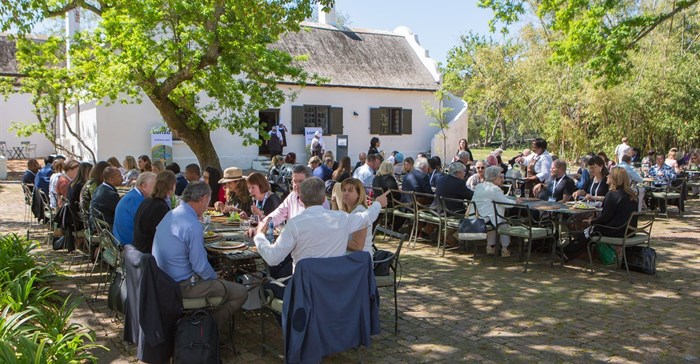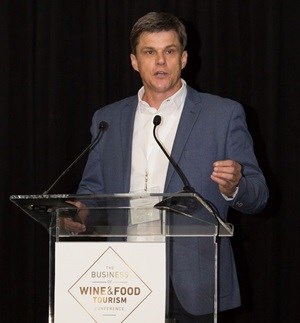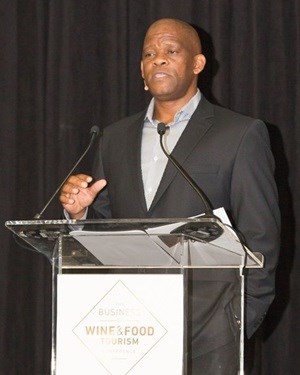
Top stories






More news


Marketing & Media
Ads are coming to AI. Does that really have to be such a bad thing?














Biggs believes that travel and tourism can potentially contribute significantly more than it currently does to South Africa’s national GDP. The World Travel and Tourism Council (WTTC) has calculated that last year, the direct contribution of the travel and tourism sector to the South African economy was worth R127.9bn, accounting for 3% of the country's GDP. The indirect contribution was approximately 9%, according to South African Tourism.

Rico Basson, executive director of Vinpro, the non-profit organisation that represents around 3,500 South African wine producers and cellars, used the example of the Wine Industry Strategic Exercise (WISE) initiative, launched in 2015, to illustrate how collaboration is paramount to unlocking value and stimulating growth.
WISE was developed by the South African wine and brandy industry to help it reach a desirable future state by 2025. Its robust and adaptable approach is geared towards driving profitability, global competitiveness and sustainability. It is a collaborative effort driven by Vinpro, SALBA (South African Liquor Brandowners Association), SAWIS (South African Wine Industry Information and Systems), WOSA (Wines of South Africa) and Winetech (Wine Industry Network of Expertise and Technology).
Basson mentioned key targets for the industry towards 2025, such as building a greater presence in strategic markets, specifically in the US and Africa, growing Cape wine tourism to increase visitor numbers by 25%, and increasing Cape wine tourism’s annual direct contribution to South Africa’s national GDP from R6bn to R16bn. He also highlighted the use of technology and research in continuing to create a sustainable future for the overall industry.
Tim Harris, head of Wesgro, the Western Cape’s trade and investment promotion agency, foresees continued growth potential in tourism for the region. He referenced the Fourth Industrial Revolution, its disruptive effect on all economies, and especially the necessity for Africa to adapt in terms of digital skills development, changing business models and public-private partnerships to advance its ‘Africa rising’ narrative.
“The Cape Winelands offers a high-quality slow product in a world where time is seen as increasingly rare and valuable. The Business of Wine & Food Tourism Conference provides an incredible opportunity to celebrate this,” Harris said.
Representing South African Tourism, Amanda Kotze-Nhlapo explained how the entity is rallying South Africans and the economic sector to fully support tourism growth with the launch of the ‘We Do Tourism’ movement, on 29 September 2017. “Every citizen of South Africa plays a role in local tourism. We are in a crisis if we don’t support tourism. It creates jobs, enriches lives and brings people together.”

Jerry Mabena, CEO of Thebe Services that owns the Thebe Tourism Group surmised that South African Afropolitans could boost the annual South African economy by more than R2bn and grow tourism. That is if they are given appealing reasons to travel to the Cape Winelands. He described Afropolitans as cosmopolitan Africans, global in their outlook, straddling the divide between African and Western cultures and having the disposable income for travel. Yet they are not really targeted by the local travel and tourism industry.
Mabena suggested that wineries rethink and refocus their marketing efforts, and create events around wine drinking, activated in spaces that Afropolitans can relate to. “Make wine drinking accessible - take away the snob value and mystery but leave some ‘upmarket’ attributes. Encourage Afropolitans to meet the owners and/or winemakers at cellars - make them feel like they are guests, not just random customers.
“Big events such as the annual Soweto Wine Festival have and continue to play a major part in bringing wine and wine-related experiences into the consideration sets of Afropolitans. Create more of these and combine wine with whisky, cognac and other spirit experiences. Experiences create stories. Polo and wine festivals seem to attract Afropolitans - expand those.”
Dr Robin Back, a South African-born, US-based academic who conducts wine tourism research in both South Africa and the US, shared the findings of his recent research study that looked specifically at the effect of a winery visit on brand loyalty and purchasing behaviour.
He explained that the results indicated that winery tourism does, in fact, have a positive long-term effect on brand loyalty and purchasing behaviour, but that the strongest effect of positive winery visitation appears to be on brand loyalty, which is shown not to diminish over time. He also mentioned the significant role of frequent and continuous communication with those who have visited, to further strengthen the bond between the brand and the consumer. Back added that wine tourism should be incorporated into overall winery marketing plans.
Dr. Robin Back talking about "The effect of a winery visit on brand loyalty and purchasing behaviour" #wfconf2017 pic.twitter.com/PX6RCCRVbF
— Wine&FoodTourismConf (@winefoodconf) September 20, 2017
Conference delegates learned about the art of impeccable service from Don Shindle, an expert in customer service from Napa, California's renowned wine tourism epicentre. He explained the importance of expertly and thoroughly trained staff, empowered to act with confidence, in achieving top service standards. “Everything communicates, so engage your workers and enable them to perform. Be agile in practices to create loyalty beyond reason, and delivery your brand promise. Teamwork means I am you, and you are me.”
Shindle’s thinking was echoed by Linda d’Holt-Hacker of South Africa’s The Touch Company, that assists large and small organisations in developing and fine-tuning outstanding customer journeys and brand experiences. Showcasing a model she calls ‘The Hosting Paradigm’ as a tool for effective decision-making, she also outlined how crucial it is for employees to understand very clearly why they do what they do – in other words, to have a sense of real purpose aligned with the brand they represent. In addition, she shared insights on how to align guest experiences with a brand’s core values and highlighted the need for a shift in how service staff are perceived and think about themselves.
Entertaining topic on "Brand aligned service excellence", with Linda d'Holt-Hacker & Tahirih Michot #wfconf2017 smiles all around! pic.twitter.com/hqsfREGRwO
— Wine&FoodTourismConf (@winefoodconf) September 20, 2017
Waterford Estate’s Kevin Arnold outlined best practice for winery tasting centres. He believes that wine brands are built in the tasting room and that unique, innovative and personal tasting experiences are paramount to creating memorable value. “At Waterford, we’ve found that we sell more wine and build greater loyalty when offering guests not only a tasting but an experience such as a vineyard safari where they get to taste our wines outside, in the vineyards. Personalised experiences help us form real connections with our guests. Wine brings them through the door, experience brings them back.” Arnold views visitors as guests, not customers. He also believes in in-depth training and development of staff, mentorship, building confidence and ensuring that employee aspirations fit with those of the brand.
General manager of Contiki in South Africa, Kelly Jackson, presented ways in which virtual reality could be very effectively used as a strategic marketing tool to bring a product or service to life. She, however, cautioned against using virtual reality as a gimmick and suggested that brands use it only if it fits with the experience they aim to promote.
Kelly Jackson with "Virtual Reality - is this the new marketing?" What do you think? Another interesting & fun topic to discuss! #wfconf2017 pic.twitter.com/D2QCfQkBje
— Wine&FoodTourismConf (@winefoodconf) September 20, 2017
Meanwhile, world-renowned US lifestyle TV personality, Andrea Robinson, one of only 23 female master sommeliers in the world, covered the process of choosing wines for Delta Air Lines and showed how the airline uses its marketing and media properties such as its in-flight magazine and onboard entertainment system to highlight specific wines and wine routes. She also elaborated on other marketing activities including sponsorships and partnerships, themed wine region promotions in strategically located hubs, and the up-skilling of flight attendants in terms of wine knowledge and service.
Dr Jaisheila Rajput, founder and CEO of Tomorrow Matters Now (TOMA-Now), an independent consultancy focused on developing the green economy with special emphasis on value chain management and growth, together with Joe Stead of the Spur Corporation, and Luke Grant and Jessica Shepherd of The Table at De Meye in Stellenbosch, winner of the Eat Out Sustainability Award in 2016, presented a panel discussion focused on the role hotels, wineries, restaurants and consumers can play in promoting a sustainable future, particularly addressing the issue of food waste management.
Rajput said that the sustainability movement had already started in South Africa, with clear examples provided by Stead, Grant and Shepherd. Stead mentioned that although waste management is a complex issue, the Spur Corporation has had major successes, from Spur restaurants recycling cooking oil to produce biodiesel to John Dory outlets eliminating all plastic packaging in a bid to tackle the issue of ocean pollution.

Reputation management and strategic communication specialist Wendy Masters of The Phoenix Partnership, based in Cape Town, educated delegates on the key phases of crisis communication: prepare, respond and recover. She believes that reputation is about delivery, not promise, and described how proactive approaches to crisis situations could actually strengthen brand reputation, citing the example of The Vineyard Hotel in Newlands, Cape Town.
“When the water shortage crisis in the Western Cape became evident, immediate action was taken to remove plugs from bathtubs and install low-flow shower heads in all guest bathrooms. These efforts clearly demonstrated the hotel’s commitment to sustainability, recognised and applauded by guests and other stakeholders such as local government,” Masters said.